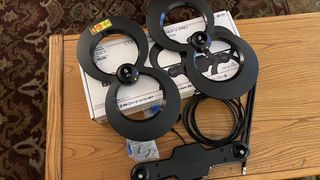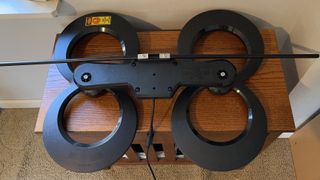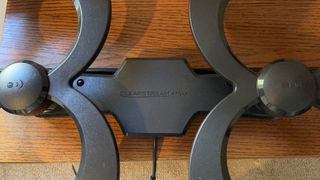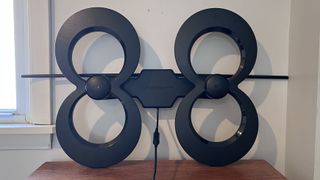Antennas Direct ClearStream Max-V Pro: Two-minute review
The Antennas Direct CleaStream Max-V Pro is about as powerful an indoor antenna as you can buy. Antenna gain matters for receiving more distant or lower-power broadcast TV stations, and that gain comes from multiple, large elements like those employed in the ClearStream Max-V Pro. Compared to the best indoor TV antennas, this is quite large at about 32 x 17 x 4 inches and is billed by Antennas Direct as an “indoor/outdoor” design, with both a wall-mount bracket and mast-mount hardware included. (No mast is included, but the company has several options available on its website.)
The Antennas Direct ClearStream Max-V Pro uses two double-loop UHF elements (the figure-8 shaped things) and a VHF element (the straight horizontal rod) to maximize signal-pulling abilities. All of this must be assembled out of the box, fixed to a central pod that holds a short output-cable “whip” terminated with a standard F-connector. Using supplied longer and shorter screws and plastic stand-offs, this requires only a screwdriver and should be doable by even the un-mechanically minded in 15 minutes or so, though the supplied instructions could be a lot clearer and more detailed.
The payoff, however, is the performance. The ClearStream Max-V Pro pulled in more stations from my semi-rural test location than any other indoor antenna I’ve tried – and that was without a signal amplifier, as none is included in the package. But remember, location and, especially, elevation is everything for antenna performance. My spot is about 700 feet above sea level, with clear line-of-sight to a variety of transmitters to the east, south, and southwest at distances ranging from 17 miles to more than 75 – a very nearly ideal location.

While temporarily set in a second-story window facing southeast, the ClearStream Max-V Pro received 13 main-channel carriers, spanning that full range of distances, for a total of 48 main- and sub-channels combined. And this was with no signal amplifier. When I re-scanned with a ClearStream’s18 dB “Jolt-USB” amp in line ($25, or in a bundle with the antenna, mast, and other extras for $199), these totals went up to 15 and 64 respectively – close to the results delivered by the attic-mounted full-sized, multi-element outdoor-type antenna that normally serves this location.
Of course, the price for this performance is size and bulk, in an antenna that stretches the definition of “indoor” a bit: despite its less-angular, all-black design, the Max-V Pro is going to dominate any wall upon which it’s mounted. (The fact that the supplied wall-mount bracket is plain, unfinished metal doesn’t sweeten the deal much.) And then there’s the actual price: the Max-V Pro is two to three times the cost of typical indoor antennas.
That said, this is an antenna that will bring in nearly as many stations as possible in a far-suburban or fringe/rural location, especially if located higher up in an attic or roof/mast-mount setup. In such installations, an RF signal amplifier to maximize reception and overcome the losses from longer cabling should certainly be considered (ClearStream offers a bundle that adds a short mast, signal amplifier, and splitter for $50 more on its website).
Swipe to scroll horizontally
| Antennas Direct ClearStream Max-V Pro (unamplified) | 70-plus miles | 13 | 48 |
| Antennas Direct ClearStream Max-V Pro (amplified) | 70-plus miles | 15 | 64 |
| Reference antenna | 80 miles | 15 | 70 |

Antennas Direct ClearStream Max-V Pro: Price and release date
- First available: March 2023
- Price: $159.99 ($199.99 with mast and RF amplifier)
The Antennas Direct ClearStream Max-V Pro commands a premium price but delivers premium performance, especially when combined with the optional RF amplifier. If you're looking for a less expensive but similarly powerful option specifically for an indoor installation, check out the Antop HD Smart Bar AT-500SBS.

Should you buy the Antennas Direct ClearStream Max-V Pro?
Swipe to scroll horizontally
| Attributes | Notes | Rating |
| Features | Large higher gain antenna designed to be useable indoors or out | 4.5 / 5 |
| Performance | Delivers 50-75 miles range in a reasonably open location – and possibly a bit more from a well-elevated, unobstructed one | 5 / 5 |
| Design | Big, but the high-tech design mitigates that a bit | 3.5 / 5 |
| Value | Considerably more expensive than typical indoor options | 4 / 5 |
Buy it if...
You live in a fringe/suburban or semi-rural location: The ClearStream Max-V Pro offers maximum signal-pulling ability, especially when combined with the optional RF amplifier.
You want an indoor/outdoor antenna: The Max-V Pro is designed to be mounted both indoors and outdoors, though an outdoor installation will require paying extra for the optional hardware package.
Don't buy it if...
You’re on a tight budget: The Max-V Pro’s excellent performance comes at a cost, with even the base package priced considerably higher than other indoor antennas.
You don’t want to see your antenna: This is a large, somewhat bulky and imposing antenna that will be hard to conceal in an indoor location unless you install it in an attic.
Antennas Direct ClearStream Max-V Pro review: Also consider
Antop HD Smart Bar AT-500SBS
This antenna provides nearly the same performance as the ClearStream Max-V Pro but at a lower price. It's specifically designed for indoor installation and, like the ClearStream Max-V Pro, is large and bulky.
Read our full Antop HD Smart Bar AT-500SBS review
Winegard FlatWave Amped Pro TH-3000
This indoor antenna has a more discreet design than the ClearStream Max-V Pro and provides very good performance over a 60-mile range. At around $110, it's not cheap, but a useful installation app enhances its value.
Read our full Winegard FlatWave Amped Pro TH-3000 review

How I tested the Antennas Direct ClearStream Max-V Pro
- Tested at semi-rural location
- Compared with powerful "reference" antenna
I test indoor TV antennas at a semi-rural, hilltop location with good elevation and a clear line-of-sight over nearly 360 degrees to TV transmitters ranging from about 15 to about 70 miles. This testing environment gives me the ability to evaluate models catering to a full spectrum of indoor antenna needs.
For the testing process, I first place the antenna high up in a south-facing window and run the tuning process on a TV with an ATSC 3.0 “next-gen TV” tuner. I then record the number of carriers tuned, along with the total number of sub-channels. A powerful inside-the-attic rooftop-type antenna at the same location is also used as a reference for comparison.
First reviewed October 2024




:quality(85):upscale()/2023/09/21/802/n/1922729/d9a11ce9650c8850437280.00070284_.jpg)


:quality(85):upscale()/2024/10/30/711/n/1922441/c62313206722590ade53c4.47456265_.jpg)

 English (US) ·
English (US) ·